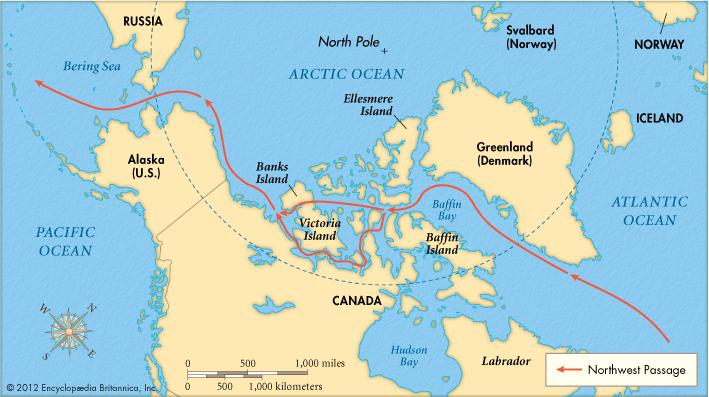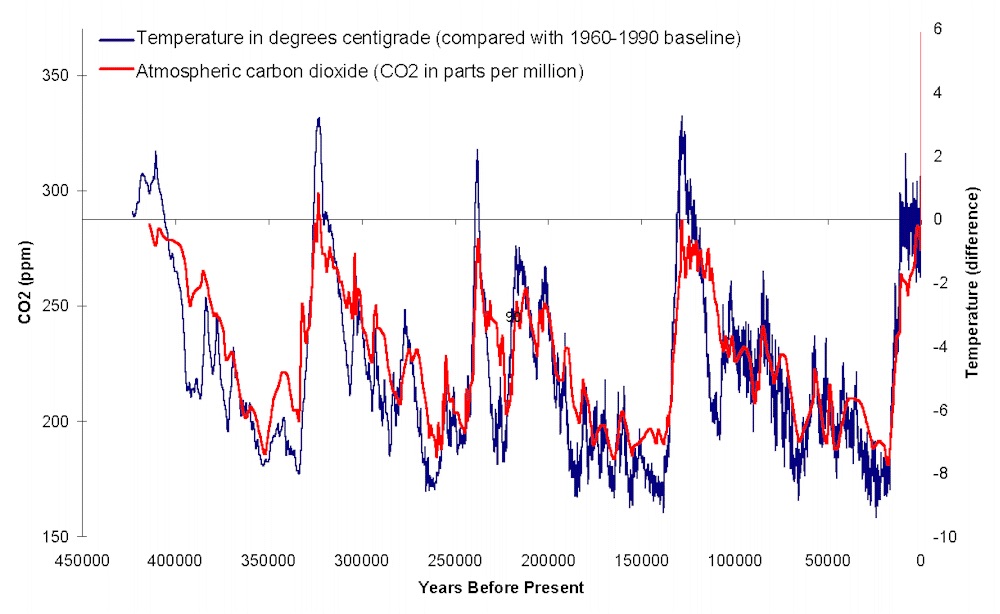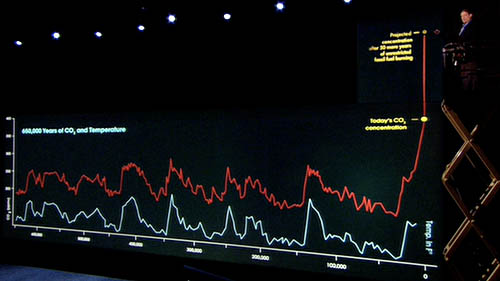It looks like you're using an Ad Blocker.
Please white-list or disable AboveTopSecret.com in your ad-blocking tool.
Thank you.
Some features of ATS will be disabled while you continue to use an ad-blocker.
Arctic Sea Ice Reaches Lowest Maximum Extent On Record; Antarctic Melt Now Also On Eastern Shelf
page: 1share:
NSIDC
This potentially could lead to sea an ice free summer in the arctic.
Nature (PDF)
Washingto n Post
If only we could carve it up and sit the pieces on drought stricken areas.
On February 25, 2015, Arctic sea ice extent appeared to have reached its annual maximum extent, marking the beginning of the sea ice melt season. This year’s maximum extent not only occurred early; it is also the lowest in the satellite record. However, a late season surge in ice growth is still possible. NSIDC will post a detailed analysis of the 2014 to 2015 winter sea ice conditions in early April.
This potentially could lead to sea an ice free summer in the arctic.
Nature (PDF)
Washingto n Post
A hundred years from now, humans may remember 2014 as the year that we first learned that we may have irreversibly destabilized the great ice sheet of West Antarctica, and thus set in motion more than 10 feet of sea level rise.
Meanwhile, 2015 could be the year of the double whammy — when we learned the same about one gigantic glacier of East Antarctica, which could set in motion roughly the same amount all over again. Northern Hemisphere residents and Americans in particular should take note — when the bottom of the world loses vast amounts of ice, those of us living closer to its top get more sea level rise than the rest of the planet, thanks to the law of gravity.
If only we could carve it up and sit the pieces on drought stricken areas.
edit on 3/20/2015 by Kali74 because: (no reason given)
a reply to: BornAgainAlien
Is that your "expert/professional" opinion?
Is that your "expert/professional" opinion?
edit on 20-3-2015 by Grimpachi because: durp
a reply to: Kali74
Yes, there are years like that.
There have been years like that ever since prehistoric times.

Source: en.wikipedia.org...
The Earth is not static. It never was, and it will never be.
Yes, there are years like that.
There have been years like that ever since prehistoric times.

Source: en.wikipedia.org...
The Earth is not static. It never was, and it will never be.
a reply to: swanne
When was the last previous to the industrial age?
What is the causation of each time it happens?
Is the causation always the same?
If it's not a single cause, what rules out radiative forcing due to increased greenhouse gases in the atmosphere?
When was the last previous to the industrial age?
What is the causation of each time it happens?
Is the causation always the same?
If it's not a single cause, what rules out radiative forcing due to increased greenhouse gases in the atmosphere?
a reply to: Kali74
Come on just stop.
It is not historical in any way, unless you mean the 35 years satellites have been taking pics.
A wooden sail boat with a 7 man crew navigated the "northwest passage" in 1905.
Long before we had reached "out of control warming".
Temps have been much higher in history, the Arctic has been all but ice free in the late 1800s to early 1900s.
Just more chicken little propaganda from the AGW croud.
Come on just stop.
It is not historical in any way, unless you mean the 35 years satellites have been taking pics.
A wooden sail boat with a 7 man crew navigated the "northwest passage" in 1905.
Long before we had reached "out of control warming".
Temps have been much higher in history, the Arctic has been all but ice free in the late 1800s to early 1900s.
Just more chicken little propaganda from the AGW croud.
edit on 20-3-2015 by johnwick because: (no reason given)
The biggest factor that is never included in IPCC
results is the Sun. The Sun is WAY down in magnetism. Ulysses Swoops
showed a 30% (yes 30) drop in Heliospheric pressure from 1998 to 2008.
Coincidentally right when the poles began to wander.
Not only has the heliosphere shrunk, we are due for an ice age.
During the last ice age Alaska and much of the Northwest was ice free.
Yet places from the Dakotas and east were under
thousands of feet of ice. The Sun seems to be pointing us in that direction
regardless of politics . I for one am all for reduced carbon emissions and much more regulation
But a sleeping Sun is the boss. We'll have to wait and see, in the US far more cold records were broke
in the last 3 years than heat, especially this year. February was the coldest month ever recorded.
results is the Sun. The Sun is WAY down in magnetism. Ulysses Swoops
showed a 30% (yes 30) drop in Heliospheric pressure from 1998 to 2008.
Coincidentally right when the poles began to wander.
Not only has the heliosphere shrunk, we are due for an ice age.
During the last ice age Alaska and much of the Northwest was ice free.
Yet places from the Dakotas and east were under
thousands of feet of ice. The Sun seems to be pointing us in that direction
regardless of politics . I for one am all for reduced carbon emissions and much more regulation
But a sleeping Sun is the boss. We'll have to wait and see, in the US far more cold records were broke
in the last 3 years than heat, especially this year. February was the coldest month ever recorded.
a reply to: johnwick
You stop it!
You post nonsense on the first couple of pages of these threads, then disappear when someone counters your BS. It makes the discussion start off dealing with trash posts, and most of us do not appreciate it.
Perhaps if you took the time to look at the Earth, and the damage our species has done, then maybe you could look at the human induced climate change dilemma in a rational matter.
Hopefully you realize how irrational and illogical your posts are in these climate threads.
There are many reasons why we should be alarmed at the climate changes we are currently experiencing!!!
You stop it!
You post nonsense on the first couple of pages of these threads, then disappear when someone counters your BS. It makes the discussion start off dealing with trash posts, and most of us do not appreciate it.
Perhaps if you took the time to look at the Earth, and the damage our species has done, then maybe you could look at the human induced climate change dilemma in a rational matter.
Hopefully you realize how irrational and illogical your posts are in these climate threads.
There are many reasons why we should be alarmed at the climate changes we are currently experiencing!!!
originally posted by: swanne
Yes, there are years like that.
There have been years like that ever since prehistoric times.
Source: en.wikipedia.org...
The Earth is not static. It never was, and it will never be.
Couple of things:
1) As modern humans arose some 250,000 years ago... look where they are on that chart.
2) Look at the temperature scales and consider that we are currently on track for 6.3° - 13.3°F temperature rise by 2100.
Sure, the Earth changed in the past - something struck the Earth hard enough to turn the surface into a molten ocean and spew enough debris out that the Moon formed. Would you want to live there?
edit on 13Fri, 20 Mar 2015 13:43:45 -0500America/ChicagovAmerica/Chicago3 by Greven because:
(no reason given)
a reply to: UnderKingsPeak
Can you show us ignorant fools how the sun isn't included in the IPCC reports?
Can you show us ignorant fools how the sun isn't included in the IPCC reports?
originally posted by: Kali74
When was the last previous to the industrial age?
-Pleistocene
-Pliocene
-Miocene
-Oligocene
-Eocene
-Palaeocene
-Cretaceous
-Jurassic
-Triassic
-Permian
-Carboniferous
-Devonian
-Silurian
-Ordovician
-Cambrian
-Precambrian
What is the causation of each time it happens?
Uncertain.
Is the causation always the same?
Since the cause is unknown with 100% certainty, then the repetition of cause is also unknown.
If it's not a single cause, what rules out radiative forcing due to increased greenhouse gases in the atmosphere?
It is a possibility amongst so many others. The true scientific method is to treat theories as theories, not as fact.
physics.stackexchange.com...
originally posted by: jrod
a reply to: johnwick
You stop it!
You post nonsense on the first couple of pages of these threads, then disappear when someone counters your BS. It makes the discussion start off dealing with trash posts, and most of us do not appreciate it.
Perhaps if you took the time to look at the Earth, and the damage our species has done, then maybe you could look at the human induced climate change dilemma in a rational matter.
Hopefully you realize how irrational and illogical your posts are in these climate threads.
There are many reasons why we should be alarmed at the climate changes we are currently experiencing!!!
I get bored of banging my head against a wall.
What do you expect.
Oh and getting told I am irrational and or illogical because I keep posting historic facts that get ignored, because the go against the climate models...which are always wrong.
Models, that is the only "proof" if climate change.
They are always wrong.
I use facts, like a Norwegian named Roald Amundson successfully sailed through the northwest passage because there was so little ice in the arctic in 1905.
How is anything to do with that BS?
It is a historical fact.
If this was a court case with AGW in trial this would be called precedence, as we know it happened.
We do not have any facts from a model that has historically been wrong about every prediction.
See how that works?
Facts.
No conjecture.
Facts.
originally posted by: Greven
Look at the temperature scales and consider that we are currently on track for 6.3° - 13.3°F temperature rise by 2100.
Yes, just like Al Gore predicted we would all be cooked to death by now.
It's fun to make sensationalist speculations of things one century in te future, unfortunately sometimes Mother Nature doesn't get the memo.
originally posted by: Kali74
a reply to: johnwick
Cool.
Links please?
en.m.wikipedia.org...
You always act like you are so sure of AGW, but you just don't have all the facts.
There is a ton of historic data that at the very least sheds enormous doubt on all AGW claims.
edit on 20-3-2015 by johnwick because: (no
reason given)
I use facts, like a Norwegian named Roald Amundson successfully sailed through the northwest passage because there was so little ice in the arctic in 1905.
Tell us more about how navigating the Northwest passage negates the loss of Arctic Ice.
BTW here is what the Northwest passage is.

originally posted by: Kali74
a reply to: swanne
When was the last previous to the industrial age?
What is the causation of each time it happens?
Is the causation always the same?
Questions even "the consensus" can't answer conclusively.
If it's not a single cause, what rules out radiative forcing due to increased greenhouse gases in the atmosphere?
Well, in the case of CO2, anyhow, it's because the rise in CO2 tends to lag behind temperature rises, not precede them.

a reply to: johnwick
The proofs in climate change lie within concepts like radiative forcing, increasing CO2 and CH4 concentrations in the atmosphere. Also the Ice is melting, we have less ice now than we ever have in modern times. How can you just simply ignore this reality?
The models you speak about are not relevant to this discussion. You find a handful of outliers, cherry-pick those data points then go on to claim that the models are all wrong. This would be no different in looking at the outliers of the National Hurricane Center's 'spaghetti' models, then claiming all the models are bad because they storm did not do what the outliers predicted, meanwhile completely ignoring the consensus of the rest of the models that generally do a pretty good job in predicting where the storm is going.
I am not even going to address the logic fallacies in your arguments. Where are these facts that you write about? Do you really expect an intelligent person reading your posts will believe what you write is factual because you wrote the word fact over and over again?
The proofs in climate change lie within concepts like radiative forcing, increasing CO2 and CH4 concentrations in the atmosphere. Also the Ice is melting, we have less ice now than we ever have in modern times. How can you just simply ignore this reality?
The models you speak about are not relevant to this discussion. You find a handful of outliers, cherry-pick those data points then go on to claim that the models are all wrong. This would be no different in looking at the outliers of the National Hurricane Center's 'spaghetti' models, then claiming all the models are bad because they storm did not do what the outliers predicted, meanwhile completely ignoring the consensus of the rest of the models that generally do a pretty good job in predicting where the storm is going.
I am not even going to address the logic fallacies in your arguments. Where are these facts that you write about? Do you really expect an intelligent person reading your posts will believe what you write is factual because you wrote the word fact over and over again?
new topics
-
NYPD arrests migrant who allegedly set woman on fire on subway train, watched her burn to death
Breaking Alternative News: 40 minutes ago -
Chef Gerald R. Ford
Food and Cooking: 3 hours ago -
The clotting is not going away latest
Medical Issues & Conspiracies: 3 hours ago -
F-18 shot down over Red Sea....by our own Destroyer?
Other Current Events: 5 hours ago -
California Business Owners Blindsided by Surprise Payroll Taxes
US Political Madness: 5 hours ago -
Anti-Government Protest in Serbia
Social Issues and Civil Unrest: 10 hours ago -
The Effects of Electric Fields and Plasma on Plant Growth
Science & Technology: 11 hours ago
top topics
-
California Business Owners Blindsided by Surprise Payroll Taxes
US Political Madness: 5 hours ago, 20 flags -
The Effects of Electric Fields and Plasma on Plant Growth
Science & Technology: 11 hours ago, 9 flags -
The clotting is not going away latest
Medical Issues & Conspiracies: 3 hours ago, 9 flags -
Anti-Government Protest in Serbia
Social Issues and Civil Unrest: 10 hours ago, 6 flags -
F-18 shot down over Red Sea....by our own Destroyer?
Other Current Events: 5 hours ago, 5 flags -
NYPD arrests migrant who allegedly set woman on fire on subway train, watched her burn to death
Breaking Alternative News: 40 minutes ago, 3 flags -
Chef Gerald R. Ford
Food and Cooking: 3 hours ago, 2 flags
active topics
-
NYPD arrests migrant who allegedly set woman on fire on subway train, watched her burn to death
Breaking Alternative News • 4 • : SteamyAmerican -
California Business Owners Blindsided by Surprise Payroll Taxes
US Political Madness • 9 • : 38181 -
F-18 shot down over Red Sea....by our own Destroyer?
Other Current Events • 7 • : Xtrozero -
The clotting is not going away latest
Medical Issues & Conspiracies • 6 • : GENERAL EYES -
The truth lets admit it
Aliens and UFOs • 78 • : DaydreamerX -
Incoming TRUMP Admin will Declare a National Emergency to Mass Deport People Here Illegally.
Social Issues and Civil Unrest • 128 • : WeMustCare -
-@TH3WH17ERABB17- -Q- ---TIME TO SHOW THE WORLD--- -Part- --44--
Dissecting Disinformation • 3789 • : 777Vader -
U.S. Officially Withdraws From the World Health Organization
Breaking Alternative News • 77 • : WeMustCare -
NYPD Chief Jeffrey Maddrey Resigns - Forced Officers to Give Sex for Overtime Pay and Favors.
Posse Comitatus • 11 • : WeMustCare -
The Effects of Electric Fields and Plasma on Plant Growth
Science & Technology • 5 • : rickymouse

